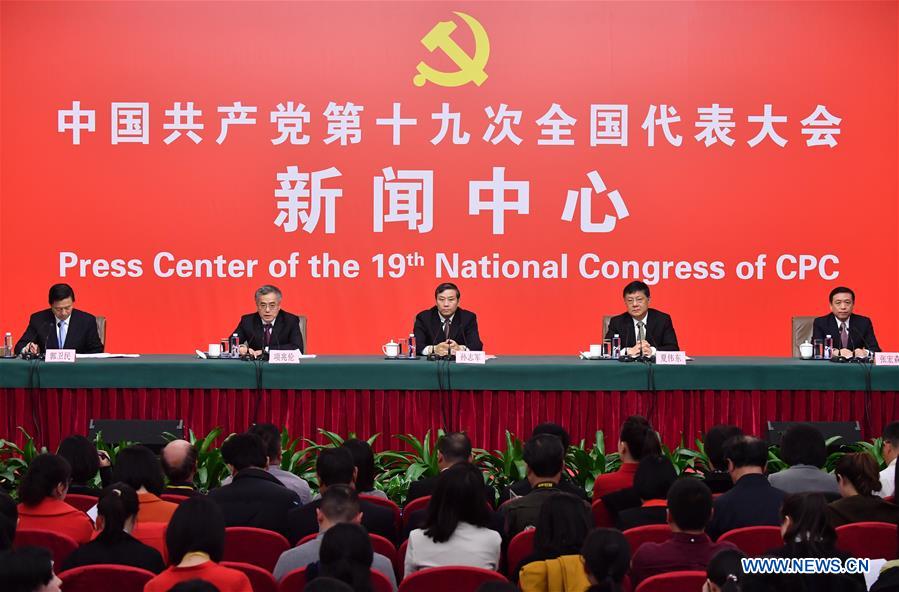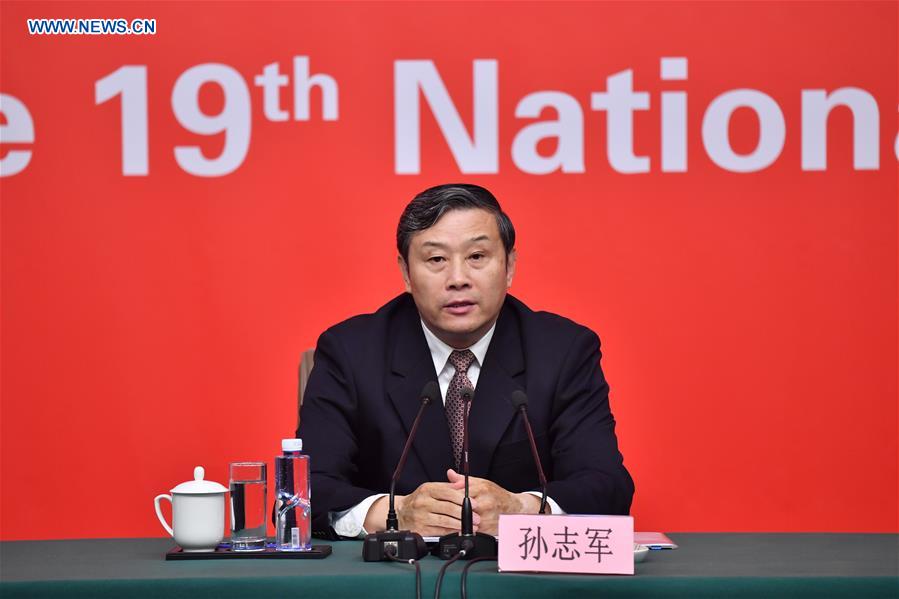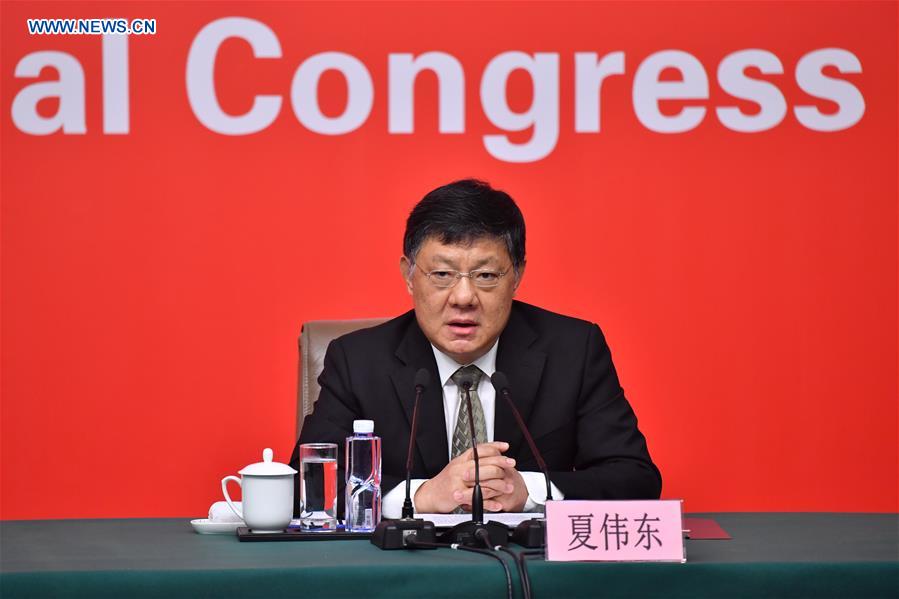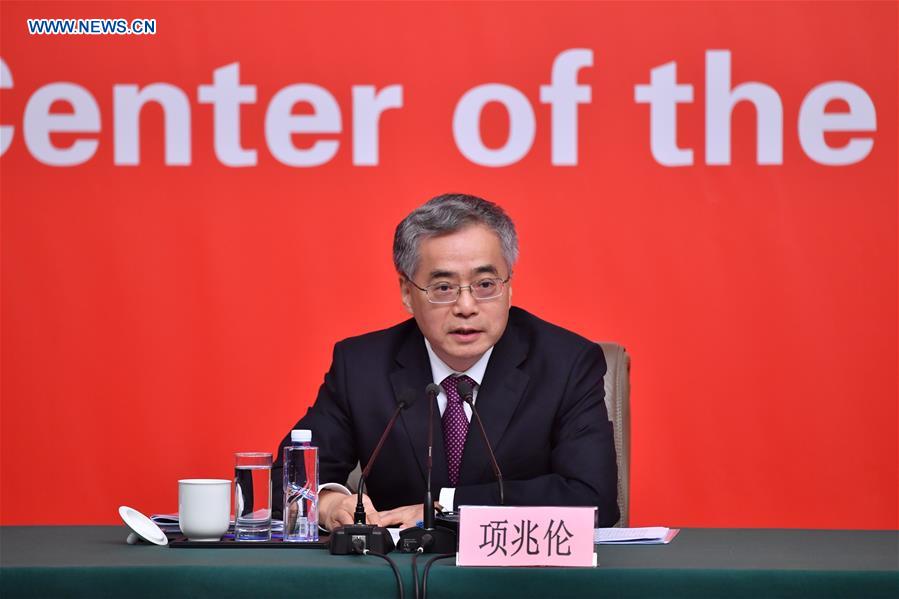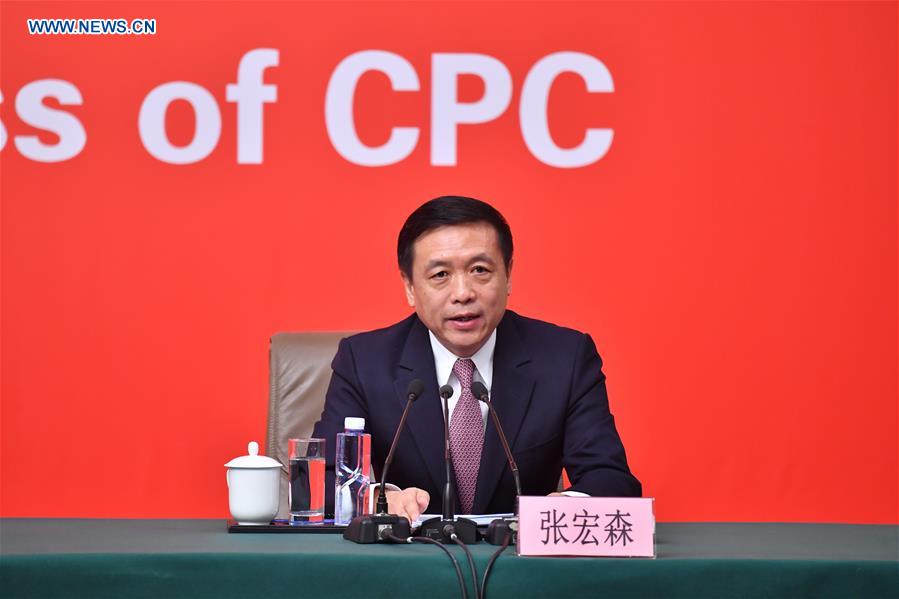Press briefing on promoting ideological, ethical and cultural progress
Speakers:
Mr. Sun Zhijun, deputy head of the Publicity Department of the Communist Party of China (CPC) Central Committee
Mr. Xia Weidong, deputy director of the Office of the National Steering Committee for Ethical and Cultural Progress
Mr. Xiang Zhaolun, vice minister of the Ministry of Culture
Mr. Zhang Hongsen, vice minister of the State Administration of Press, Publication, Radio, Film and Television
Chairperson:
Guo Weimin, spokesperson for the 19th CPC National Congress and deputy director of the State Council Information Office of China
Date:
Oct. 20, 2017
|
The press center of the 19th National Congress of the Communist Party of China (CPC) holds a press conference on promoting ideological, moral and cultural progress, in Beijing, capital of China, Oct. 20, 2017. Sun Zhijun (C), vice minister of the Publicity Department of the CPC Central Committee, Xia Weidong (2nd R), deputy director of the General Office of the Central Spiritual Civilization Development Steering Commission, Vice Culture Minister Xiang Zhaolun (2nd L) and Zhang Hongsen (1st R), deputy minister of the State Administration of Press, Publication, Radio, Film and Television attended the conference. [Photo/Xinhua] |
Guo Weimin:
Ladies and gentlemen, good morning. Welcome to the second press conference held at this press center related to the 19th CPC National Congress. Today, we are delighted to have with us Mr. Sun Zhijun, deputy head of the Publicity Department of the CPC Central Committee; Mr. Xia Weidong, full-time deputy director of the Office of the National Steering Committee for Ethical and Cultural Progress; Mr. Xiang Zhaolun, vice minister of the Ministry of Culture; and, Mr. Zhang Hongsen, vice minister of the State Administration of Press, Publication, Radio, Film and Television.
They will introduce the work related to promoting China's ideological, ethical and cultural progress, and answer some of your questions.
Now I will give the floor to Mr. Sun Zhijun.
|
Sun Zhijun, vice minister of the Publicity Department of the Central Committee of the Communist Party of China (CPC), speaks at a press conference held by the press center of the 19th CPC National Congress in Beijing, capital of China, Oct. 20, 2017. The press conference was themed on promoting ideological, moral and cultural progress. [Photo/Xinhua] |
Sun Zhijun:
Since the 18th National Congress of the Communist Party of China (CPC) in 2012, the CPC Central Committee with Comrade Xi Jinping at the core has attached great importance to the publicity, ideological and cultural work. General Secretary Xi Jinping has chaired a series of important meetings on literature and artwork, news and public opinion, network information, philosophy and social sciences. With his visionary planning and instruction, and comprehensive and unprecedentedly powerful and pragmatic measures, breakthroughs have been made in publicity, ideological and cultural work. The outcomes of the Party's theoretical innovation have gained greater popularity, and its communication ability, influence and credibility have also been enhanced significantly. The core values of socialism have been written into laws and regulations, and have integrated into Chinese society. Literature and art are booming in the country. Cultural services to the public are becoming increasingly standardized and equalized, and the cultural market has become increasingly vibrant and prosperous. China's cultural soft power has improved greatly, which has contributed to the efforts aimed at pushing forward historic transforms in the undertakings of the Party and the country.
When promoting cultural progress, we have pursued reforms in a systematic, holistic, and coordinated way. Great efforts have been made to promote innovation in our institutions. Cultural reform frameworks have substantially taken shape.
(1) Major innovations have been made in the development philosophy in the cultural sector. General Secretary Xi said that cultural confidence represents a fundamental and profound force that sustains the development of a country and a nation. He stressed that social benefits should always be the priority, though economic benefits should also be pursued. He emphasized that the creation of cultural products should be people-oriented. He stressed that China's outstanding traditional culture should be developed creatively. Chinese culture and China's stories should be presented to the world at a faster pace and in a better way. He emphasized that reform should stay true to its original purpose. His insightful new thoughts reflect the Party's new strategic thinking and understanding of cultural development under the socialism with Chinese characteristics.
(2) Structural reform in the cultural sector has yielded significant results. We have released over 70 important documents on topics including the integration of social and economic benefits, media convergence, the development of high-end think tanks, reform of literature and art awards, and the aid given to industries such as TV, film and traditional opera. The governance of internal and external publicity work and the administration of cyberspace affairs have also become more coordinated. We have worked vigorously to promote the establishment of a national cultural asset management system and modern enterprise system with unique cultural characteristics. A series of major trial reform projects have been launched. The pillars of the cultural system under socialism with Chinese characteristics have been put in place.
(3) Much headway has been made in the development of cultural programs and industries. Laws have been enacted to ensure the government is responsible for meeting people's basic cultural needs. A public service framework is taking shape. Supply-side reform has made positive progress. At the end of 2016, the total value added of the cultural industry reached 3.08 trillion yuan, and its share of GDP reached 4.14 percent. China has become the largest book publisher and TV drama producer and broadcaster in the world. It also has more movie screens than any other country. A number of masterpieces have made a strong impact. China's brands, voice, and image have gained increased recognition around the world.
(4) Legislation in the cultural sector has made major achievements. Four relevant laws have been promulgated, which are the Cyber security Law, the Film Industry Promotion Law, the Public Cultural Service Guarantee Law, and the National Anthem Law. The Standing Committee of the National People's Congress has released the Decisions on Strengthening Network Information Protection. A large number of culture-related administrative regulations and rules have been released or amended.
In conclusion, since the 18th National Congress, substantial progress has been made in the cultural sector. We firmly believe that under the strong leadership of the CPC Central Committee with Comrade Xi Jinping at its core, we will make a greater contribution to the fulfillment of the Two Centenary Goals and the Chinese Dream of national rejuvenation. Thank you.
Guo Weimin:
Now, I will give the floor to Mr. Xia Weidong.
|
Xia Weidong, deputy director of the General Office of the Central Spiritual Civilization Development Steering Commission, speaks at a press conference held by the press center of the 19th National Congress of the Communist Party of China (CPC) in Beijing, capital of China, Oct. 20, 2017. The press conference was themed on promoting ideological, moral and cultural progress. [Photo/Xinhua] |
Xia Weidong:
Good morning everyone. Glad to have the opportunity to speak with you.
As you may have noticed, expressions like "historic change" and "historic achievements" have been used to summarize China's development since the 18th CPC National Congress. I think such phrases are completely applicable to China's ideological, moral and spiritual progress. In modern times, China has never been as close to the dream of national renewal as it is today. The CPC Central Committee with Comrade Xi Jinping at its core has complied with the Chinese people's expectations and put forward to secure a decisive victory in building a moderately prosperous society in all respects, to achieve the Two Centenary Goals, and to realize the Chinese Dream of national rejuvenation.
A series of new concepts, thoughts, and strategies have been introduced to advance the goals and dreams that embody the fundamental interests of the Chinese nation and all its citizens. These include the five-sphere integrated plan, the four-pronged comprehensive strategy, the new development principles, and the core values of socialism, which require all Chinese to unite around ideals, values and ethics, and to work together to achieve shared goals. The Thought on Socialism with Chinese Characteristics for a New Era by Xi Jinping is the latest achievement of the theoretical innovation of our Party, which embodies the principles of building socialism with Chinese characteristics and reveals a fundamental strategy ensuring that our great goals and dreams must and surely will be realized.
All people across China work with theory and practice upon these shared ideological and moral foundations. Reinforcing these foundations has been the focus of China's civilizational development in the five years since the 18th CPC National Congress.
On the one hand, we have conscientiously carried out innovative research, education and dissemination of our theories to help people better understand this powerful ideological weapon and use it to guide the practice of achieving these great goals and dreams. The comprehensive education and dissemination of socialism with Chinese characteristics, the Chinese Dream, and the core values of socialism have made clear the following: socialism with Chinese characteristics was the fundamental achievement after tremendous and strenuous effort , and should be cherished; the Chinese Dream is the dream of the country and its citizens, and everyone has the historic opportunity to realize his or her dream; and the core values of socialism are the essential principles supporting the efforts to achieve our great goals and dreams, which embody the values of the country, society and citizens.
On the other hand, we have made great efforts to strengthen and innovate the spiritual development of our civilization. We have promoted role models and values by conferring honorary titles such as "most beautiful person ," "virtuous person," "paragon of morality," and "role model of the times" in China; built exemplary cities, villages, townships, organizations, families and schools; and fostered a culture of integrity and encouraged voluntary service to promote cultural and ethical progress within society.
Looking back at the past five years, we feel deeply that the ideological unity of the Party and society has become more solid, a new ideological and moral consensus has been formulated and a new spiritual perspective has been adopted. To strive for great goals and dreams has become the strongest imperative of the whole society. Thank you!
Guo Weimin:
Now let us invite Xiang Zhaolun to speak with us.
|
Chinese Vice Culture Minister Xiang Zhaolun speaks at a press conference held by the press center of the 19th National Congress of the Communist Party of China (CPC) in Beijing, capital of China, Oct. 20, 2017. The press conference was themed on promoting ideological, moral and cultural progress. [Photo/Xinhua] |
Xiang Zhaolun:
In the report delivered at the opening of the Party's 19th National Congress, General Secretary Xi Jinping gave important instructions on the progress of socialist culture, and the development of cultural programs and industries. He said that to meet people's new aspirations for a better life, we must provide them with rich intellectual nourishment. This instruction will be the guide for our next steps. Now, I'd like to introduce three aspects of our work.
1. The creation and production of cultural products.
Since the Party's 18th National Congress, we have carefully put into practice the important thought of General Secretary Xi's speeches on cultural works. A series of projects have been launched to foster outstanding productions of the performing arts at the national level, to rejuvenate traditional Chinese operas, to popularize and revitalize national operas in China, and to promote the national development and collection of works of fine art. In 2015 and 2016, nearly 2,900 original shows were presented nationwide.
You may have noticed that China's performance market has become increasingly diversified. It has provided more platforms for the public to access cultural products, and helped common people to receive more benefits from robust cultural creation. A series of art festivals have been held, including the 10th and 11th China Art Festivals, and special festivals showcasing Peking opera and Kunqu opera. Themed events for local operas, children's plays, dance productions, acrobatic shows and various other performances have also been staged. In particular, the Galaxy Award has hosted more than 14,000 events to present various shows to the public and to select the best from them. They attracted a total audience of nearly 1 billion annually from 2013 to 2016.
2. Public cultural service.
In recent years, we have committed to making cultural products more accessible to the public, pooled all our resources to promote cultural progress and ensured all sides are benefitting from this process. We have accelerated the building of a modern public service system. Presently, there are 3,153 public libraries, 4,109 museums and memorial halls, 3,322 cultural centers at the county level or above and 41,175 cultural stations at township level. At least two-thirds of villages have their own cultural center, and all communities have a special space for cultural activities. A six-tier public cultural service network is fundamentally in place, providing services to both rural and urban residents at national, provincial, city, county, township and village (community) levels. From 2013 to 2016, nearly 2.3 billion people visited public libraries, and nearly 3 billion people visited museums.
3. The protection of cultural heritage.
General Secretary Xi said that we must promote the creative evolution and development of fine traditional culture. This remark serves as the basic guidance for our work. In recent years, we have made greater efforts in protecting cultural relics. Special steps have been taken to protect the Great Wall, the Grand Canal, major historical monuments and sites related to China's revolutions. More heritage resources have been utilized. More outstanding exhibitions have been presented. More creative merchandise related to cultural heritage has been produced. More Chinese cultural relics went overseas for exhibition, greatly boosting cultural exchange with other countries. In protecting our intangible cultural legacy, we have committed to ensuring that this heritage can be passed down to the next generation and encourage further cultural development. After extensive research, we launched a project to record the practices of those who bear our cultural heritage. We have vigorously promoted the teaching and training of these practices. In 2016, the subsidy for representative bearers of national cultural heritage increased from 10,000 yuan to 20,000 yuan annually.
Together with the Ministry of Education, we have launched projects to train bearers of intangible cultural heritage. Currently, the course is available in 78 colleges. By the end of the 13th Five-Year Plan Period (2016-2020), 100,000 people are expected to have taken the course. Furthermore, we are working with other departments and local governments to launch a project to rejuvenate traditional craftsmanship and enable it to adapt to modern life. We are also working on different policies to protect and promote the development of intangible cultural heritage in oral traditions, performing arts and other fields.
Guo Weimin:
Please invite Mr. Zhang Hongsen to give his introduction.
|
Zhang Hongsen, deputy minister of the State Administration of Press, Publication, Radio, Film and Television, speaks at a press conference held by the press center of the 19th National Congress of the Communist Party of China (CPC) in Beijing, capital of China, Oct. 20, 2017. The press conference was themed on promoting ideological, moral and cultural progress. [Photo/Xinhua] |
Zhang Hongsen:
During General Secretary Xi Jinping's report to the 19th CPC National Congress the day before yesterday, he made a penetrating summary on and highly recognized the ideological, moral and cultural progress of the past five years.
We are all greatly motivated. Since the 18th CPC National Congress, under the comprehensive arrangements and requirements of the CPC Central Committee with Comrade Xi Jinping as its core, the scale of the media sector, including press, publication, radio, film and television, has been expanded, the strength of the industry has been upgraded and the capability of serving the overall interests of China has improved. China is making strides to becoming a powerful nation in the publication, radio, film and television sectors, which can be seen in the following aspects.
First, we have formed a modern media system with relatively strong influence. China has now 584 publishers for books, 1,894 publishers for newspapers, 10,084 publishers for journals, 2,578 radio and TV broadcasters including China National Radio (CNR), China Radio International (CRI) and China Central Television (CCTV), as well as a batch of new media convergence platforms. Flagship media outlets for international communication are developing rapidly. Since China Global TV Network (CGTN) began broadcasting in late 2016, it has gradually set up a multilingual, multi-channel and multi-platform framework with six TV channels, three overseas branches, and one new media cluster; CCTV has further expanded globally: its coverage of major global news events reached 97 percent in 2016.
Second, we have formed a large-scale content production system. Last year, China has published 500,000 different books, produced 7.71 million hours of radio programs, 3.52 million hours of TV programs, 772 feature films, 334 domestic TV series containing 14,912 episodes, around 120,000 minutes of TV animations, as well as over 10,000 hours of TV documentaries. China's publications of books, TV series, animations and feature films are all among the world's top. We have also introduced a batch of excellent works which spread contemporary Chinese values and demonstrate Chinese culture and spirit.
A series of themed book publications including the book featuring Xi's speeches (2016) and "Anecdotes and Sayings of Xi Jinping" were warmly received by readers. A series of mainstream films like "The Founding of an Army" and "Wolf WarriorsⅡ" have set examples in movie productions. "Wolf WarriorsⅡ" has raked in 5.6 billion yuan at the box office.
Third, we have formed a wide modern transmission and publication system. China boasts the world's largest multi-technique radio and TV transmission coverage network. The proportions of the population who have access to radio and TV are 98.37 percent and 98.88 percent respectively. The number of movie screens in China has reached 49,000, ranking first in the world. In 2016, urban theatres received 1.37 billion visits and the number is increasing this year. The number of sales outlets for publications reached 163,000.
Fourth, we have formed a well-structured industrial system. China now boasts 126 publishers, distributors and printing groups for books and journals, over 2,000 film production and investment groups, and 14,389 radio and TV production and operation entities, among which 69 are listed companies.
In 2016, China's press, publication, printing and publishing services saw a turnover of 2.36 trillion yuan, an increase of 42.17 percent over the 1.66 trillion yuan in 2012. The radio and TV sectors generated incomes of 503.98 billion yuan, an increase of 54.19 percent over the 326.85 billion yuan generated in 2012; in 2016, box office sales nationwide reached 49.28 billion yuan, an increase of 188.66 percent over the 17.07 billion yuan sales in 2012. China's media sector, including press, publication, radio, film and television is continuing to contribute an increasing share in the national economy.
Guo Weimin:
Now let's move on to the question and answer session.
